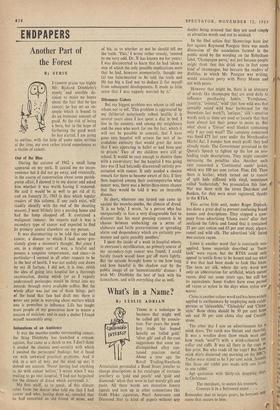4. , ENDPAPERS
Another Part of the Forest
By STRIX
Out of the Blue
During the autumn of 1962 a small lump appeared on my neck. It caused me no incon- venience but it did not go away, and eventually, in the course of conversation about some parish- pump affair, I showed it to my doctor and asked him whether it was worth having it removed. He said it would be as well to get rid of it; and on January 31, 1963 (a date which regular readers of this column, if any such exist, will readily identify with the end of the shooting season), I went blithely into a nursing home and• had the lump chopped off. It contained a malignant tumour; the experts said it was a secondary type of cancer and expected to find its primary source elsewhere on my person.
It was disconcerting to be told that one had cancer, a disease to which I had never pre- viously given a moment's thought. But since I am, in a sloppy sort of way, a fatalist and possess a sanguine temperament, and since—in particular—I seemed in all other respects to be in the best of health, I was not unduly cast down by my ill fortune. I did not, it is true, relish the idea of going into hospital for a thorough examination, during which (or so I vaguely understood) periscopes would be thrust into my innards through every available orifice. But the whole affair was just one of those things, part of the hand that fate had dealt me; there is never any point in worrying about matters which one is powerless to influence. Life has taught most people of my generation how to weave a cocoon of stoicism; and in such a shelter I found myself reasonably snug.
Intimations of an Ambience It was the mumbo-jumbo surrounding cancer, the thing Dimbleby has launched a crusade against, that came as a shock to me. I don't think it eroded the clueless semi-serenity with which I awaited the periscopes' findings; but it faced me with awkward practical problems. And it did, in a sort of way, put the wind up me; it dented my cocoon. 'Never having had anything to do with cancer before,' I wrote when I was waiting to go into hospital, 'I had not bargained for the climate of dread which surrounds it.'
My first whiff, so to speak, of this climate came from the doctor who told me that I had cancer and who, having done so; revealed that he had consulted an old friend of mine, and of his, as to whether or not he should tell me the truth. 'This,' I wrote rather crossly, 'seemed to me very odd. Dr. X has known me for years: I was disconcerted to learn that he had taken a step of which the only possible implications were that he had, however momentarily, thought me (a) too faint-hearted to be told the truth and (b) too big a fool not to deduce it for myself from subsequent developments. It made so little sense that I was vaguely worried by it.'
Dilemmas Galore But my biggest problem was whom to tell and whom not to tell. 'This problem is aggravated by my (hitherto) notoriously robust health; it is several years since I last spent a day in bed. I live in the country, and among my neighbours and the men who work for me the fact, which it will not be possible to conceal, that I have gone into hospital will arouse the sort of in- credulous curiosity that would greet the news that I was appearing in ballet or had been sent to prison.' Two of my children were 'still at school. It would be easy enough to deceive them with a cover-story; but the hospital I was going into was (I had belatedly discovered) entirely pre- occupied with cancer. It only needed a chance remark for them to become aware of this; if they then inquired among their contemporaries what cancer was, there was a better-than-evens chance that they would be told it was an incurable disease.
In short, wherever one turned one came up against the mumbo-jumbo, the climate of dread. `It is no help,' I wrote, 'to a person who has unexpectedly to face a very disagreeable fact to discover that his most pressing concern is to choose between embarking on a series of elaborate and futile prevarications or spreading alarm and despondency which are certainly pre- mature and quite possibly needless.'
I spent the inside of a week in hospital where, to everyone's mystification, no primary source of my secondary-type cancer was found; I could hardly (touch wood) have got off more lightly. But the episode brought home to me how long and how baneful is the shadow cast by the public image of an 'unmentionable' disease: I wish Mr. Dimbleby the best of luck with his iconoclasm, and with everything else as well.














































 Previous page
Previous page